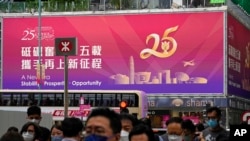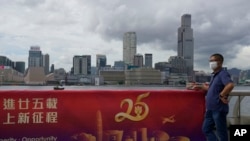According to a new study, human rights in Hong Kong have deteriorated rapidly since the crackdown on Beijing after the anti-democratic movement in 2019. The
Human Rights Measurement Initiative (HRMI)released a surveythis week. This shows the rapid changes in human rights in Hong Kong. Place China.
Jung Kim-wa, Honorary Director of the Hong Kong Public Opinion Institute, told VOA in a telephone interview that survey data shows that Hong Kong's civil society is shrinking and freedom of speech and assembly is curtailed. He said he was showing. In 2020, the Hong Kong version of the National Security Act of Chinawill be imposed.
"Hong Kong's score for Kong is a surprise to Hong Kong watchers, as the monitoring of events in Hong Kong over the last few years has been so disastrous."
VOA Cantonese contacted the Chinese Embassy in Washington, D.C. for comment on the HRMI investigation, but did not receive a response.
HRMI is conducting a national survey to assess the state's quality of life and safety. The survey has been conducted in more than 30 regions around the world and uses up to 13 criteria outlined in the UN Convention to measure the status of human rights. Respondents to the Safe Online Hong Kong Survey included local human rights workers, human rights lawyers, and journalists dealing with human rights issues.
According to HRMI's Thalia Kehoe Rowden, New Zealand and US-based HRMI did not reveal the number or identity of respondents to protect them. Some respondents emigrated from Hong Kong.

Data show that Hong Kong's freedom of assembly and association, freedom of expression, and freedom of political participation continue to decline. 3 years in a row.
For example, freedom of assembly and association is rated on a 10-point scale. Hong Kong scored 4.5 points in 2019 and 2.5 points in 2021, saying the survey results are "very bad."
Freedom of speech fell from 4.7 in 2019 to 2.7 in 2021, while voting rights dropped from 4 to 2.4 over the same period.
However, the investigation also found that the right to freedom from arbitrary arrests increased from 2.7 in 2019 to 3.5 in 2021.
And Hong Kong scored 4.6 out of 10 in its performance on rights of freedom. From torture. According to HRMI, this is in the "bad" category, which means that a significant number of people are at risk of torture and ill-treatment. " This is the fourth lowest score among the East Asian and Pacific countries that the organization is tracking. The
score reflects China's crackdown on Hong Kong after months ofdemocratic street protestsin 2019.
China's score is less than 3.5 for civil and political rights. 75% of the indicators are considered "very bad". In terms of freedom of assembly and association, freedom of speech and political participation, China has an overall score of only 2.1, the lowest of the 30 regions surveyed. This was the first year HRMI investigated China.
"Hong Kong's scores over the last three years have converged to China's very low scores," Roden told VOA Cantonese in an email Thursday night. ; Government participation] has dropped dramatically, so it's about the same as China.
Hong Kong survey respondents said Chinese law limits freedom of assembly and association, and anyone seeking to run independently is threatened, treated violently or imprisoned. He said he would be.

HRMI co-founder and research method and design leader Dr. K. Chad Clay told VOA Cantonese in an email: rice field. Since the Hong Kong version of theChina National Security Actcame into force in 2020, "speaking can lead to arrests and detentions, and many people are self-reliant to avoid their arrests. He added that he began to censor. "
" Supports this. " "Our data absolutely show that the right to opinion, expression, assembly and association continues to decline sharply."
Director of the Center for Global Studies and University of Georgia Clay, an associate professor of public and international affairs at Hong Kong, said, "The government feels the need to resort to many arbitrary and political arrests now that the rights to empowerment are increasingly limited."
"In the years since the National Security Act was passed, remarks could lead to arrests and detention, and many may have started self-censoring to avoid themselves. "To support this, our data absolutely show a continuous sharp decline in the right to opinion, expression, assembly, and association," he says. I did.
Last year, police used a rally ban that would prevent the spread of COVID-19 in order to curb a rally in Causeway Bay on June 4, as a memorial to the Tiananmen Square Incident. He said he saw him. It is a very explicit and abusive law, and the purpose and spirit of the law is contrary to its original purpose. This year, local authorities warned people to avoid theVictoria Park Cheonanmen Memorial, and policedetained severalwho ignored the warning.
Mr. Chung was also remanded for two years without being convicted of some Hong Kong political prisoners. Due to the pandemic, outsiders are not allowed to visit prisoners. One prisoner's pen and paper request was rejected.
"The most ridiculous thing is that in just a few weeks, he was transferred to different prisons five or six times for no reason," he added. "This is clearly a kind of strategy that allows people to lose autonomy and be manipulated. I think this is also torture."
Simon Cheng, founder of the British group Hongkongers He told VOA over the phone that the good thing about quantified indicators is that changes can be evaluated on the same basis. And "they don't talk beyond each other, which doesn't turn [investigation] into a political game."
"This makes China unique to each (country). You can prevent everyone from losing direction by saying that there is a standard. "


